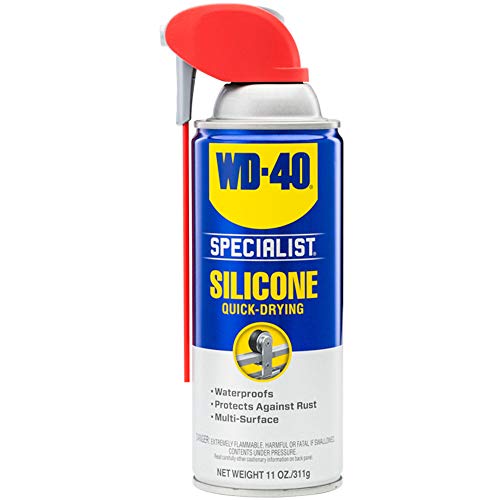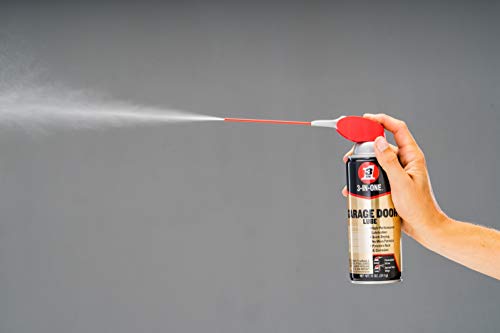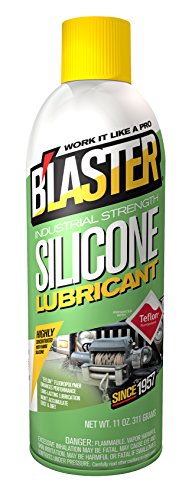There are very few things in life as annoying as a sliding door making noise, and getting stuck all the time. It’s an easy way to not only raise your blood pressure, but also throw off the entire ambiance of your exterior (and interior) space. Thankfully, there are numerous lubricants that can be applied to your sliding doors which can ensure that they open and close easily, safely, and smoothly.
To help you get started, we’ve compiled our own list of the 10 best lubricants for a sticking sliding glass door. But before we dive in, let’s take a brief look at some important considerations and concerns that people with sliding glass doors have faced over the years.
Why is my Sliding Glass Door Hard to Open?
Your sliding glass door could be hard to open for a variety of reasons, but there are a few common culprits that are typically to blame. The truth of the matter is that everything from the heat and humidity of the summer, to the cold and frigid air of the winter can cause sliding glass doors to deteriorate. As dirt, moisture, and even just normal wear and tear can damage the door and its track over time, making it incredibly difficult to open or close.
Generally, sliding glass doors will be hard to open when the tracks are bent, the rollers are dirty (or broken), or if the wheels are offline and need to be adjusted. The good news is that these are all easily fixable.
What types of Lubricants are Available?
There are three primary types of lubricants that you can use for sliding glass doors; petroleum-based, silicone-based, and wax. For the most part, Wax lubricants should be avoided for this reason because they are generally more toxic, and messier to use. Whereas silicone-based and petroleum-based lubricants are just as effective, they’re far easier to use, and generally contain less toxic materials. Any of the three are more than effective though.
Petroleum-based lube vs Silicone-based lube: What’s Better for Your Door?
Each option carries certain pros and cons, with that being said, petroleum-based lubricants (or oil lubricants) are generally thicker, and far messier to apply. Plus, since they’re so thick, dirt and dust can stick to them more quickly. Whereas silicone-based lubricants are long-lasting, and do not need to be applied several times in order to remain effective. However, you should try to steer clear of wax products, as they are known to gum up and contain more harmful properties for both pets, and humans.
It’s important to remember that some substances that these lubricants contain can be extremely harmful to you and your pets, and even though they may give the product a longer lifespan. It might not be worth it depending on who may be exposed to it. Though, this can also be avoided by finding a quality, slightly-toxic lubricant that is fast-drying.
How Often Should I Apply Lube to My Sliding Glass Door?
You only really need to apply lube to your sliding glass door once it starts to stick, and won’t open or close. While you can certainly be preemptive in your approach, there’s no set timeline that has proven to be more beneficial for people with sliding glass doors. With that being said, it is widely recommended to at the very least clean the tracks, rollers, and wheels once every month to ensure that no dirt, or debris accumulates. As this will make the entire cleaning process far more difficult down the line.
Should I Clean my Sliding Glass Door Tracks First?
Absolutely! Dirt-filled tracks are the most common reason behind the squeaking noise of sliding door, as dozens of dusts, and dirt particles can easily accumulate over time with simple daily use. And if you want to fix the problem using a quality lubricant, then you will definitely need to clear out any debris, or potential hazards that could get in the way beforehand.
First, you will need to vacuum the track to help get out any lingering specks of dust or dirt that are present. From here, you simply need to take a wet towel (or cloth), and run over the tracks to ensure that they are clear of any dirt or grime that was missed with the vacuum. You can also use a solution instead of water for increased efficiency, such as ethyl-alcohol, or even acetone nail polish removers as well. This way you can not only eliminate the potential issue at hand, but also prepare the sliding doors for further inspection, and application of the lubricant.
10 Best Lubricants for Sliding Glass Doors
1. WD-40 Specialist Water Resistant Silicone Lubricant
The WD-40 Specialist Water Resistant Silicone Lubricant is undoubtedly the best lubricant on the market for sticking sliding glass doors. It’s a silicone-based lubricant that safely waterproofs, and protects metal (and nonmetal) surfaces, including rubber, plastic, and vinyl, more effectively than any other lubricant on the market. Not only does it try incredibly fast, but it also leaves a beautiful, clear, non-staining film that doesn’t stick, or make a mess.
It also carries an effective temperature range from -100 degrees fahrenheit, to 500 degrees fahrenheit, and comes with smart straw sprays 2 ways. Offering both a precision stream or a fan-shaped spray, depending on preference and application. All things considered, it’s without question the most effective, affordable, and safe way to lubricate your sticking sliding glass door.
2. 3M Silicone Spray (Dry Type) Lubricant 
3M Silicone Spray (Dry Type) Lubricant is another exceptionally effective option that’s guaranteed to seal out moisture, while still preventing squeaking, sticking, and corrosion. Beyond this, it can also be used reliably to preserve leather and rubber, making it the optimal solution for any sort of automotive use.
With that being said, since your sliding glass door contains many of the same materials (metal, plastic, rubber), it can be used safely for this application as well. Plus, 3M is an industry-leader among sprays used for commercial and residential purposes, and their dry type, silicone spray lubricant carries extremely competitive consumer reviews. Making it a no-brainer for our list of the best lubricants for sticking sliding glass doors.
3. Why The Frog Sliding Door Lubricant
Stealing the show with the 3rd spot on our list we’ve got the incredibly effective Sliding Door Lubricant presented by Why The Frog. This amazingly long-lasting formula is instantly effective to create a more smooth motion for sliding glass doors of all styles and sizes. Plus, it’s specifically built for year-round protection with a temperature range of -35 degrees fahrenheit to 180 degrees fahrenheit. More specifically, it’s manufactured with added rust inhibitors to protect your sliding glass doors from corrosion, and non-toxic, mineral-based ingredients that are safe for humans, and pets.
As with all Why The Frog products, this lubricant is unscented, near-odorless, and emits 0 VOCs. Making it not only one of the more effective applications on the market, but one of the more eco-friendly as well. All in all, you don’t have to look far to see the immense benefits that come with using Why The Frog’s Sliding Door Lubricant.
4. CRC Heavy Duty Silicone Lubricant
The CRC Heavy Duty Silicone Lubricant is ideal for wood, metal or rubber surfaces, and is capable of withstanding incredibly moist, and harsh environments. Not only that, but the film is clean, odorless, and highly-resistant to water. Making it perfect to flush out marine engines, cooling systems, heat exchanges, cleaning and protecting boats, PWCs, trailers, RVs, bicycles, patio furniture, and much more.
Keep in mind that this lubricant should not be used as an appearance cleaner, or overtop of freshly painted surfaces. Even while this is typically thought of as a more ‘heavy-duty’ application, it can safely and effectively be used on just about any material. Making it a more than worthy addition to our list of the best lubricants for sticking sliding glass doors.
5. DuPont Teflon Silicone Lubricant Aerosol Spray
The DuPoint Teflon Silicone Lubricant Aerosol Spray remains one of the absolute best alternatives for those in search of a durable, and easy to use application for sticking sliding glass doors. The reason being that it’s a unique 100% dry-film Teflon coating and lubricant that leaves a long-lasting, micro-thin, dirt-resistant coating. And it’s effective in environments ranging anywhere from -100 degrees fahrenheit, to 500 degrees fahrenheit.
It also reliably waterproofs, protects, lubricates, and preserves a variety of different materials including metal, plastic, wood, leather, and vinyl. Despite these incredible durability features, this spray is clean, light-duty, and entirely silicone-based making it perfect for non-metal materials that might normally be damaged from conventional lubricants. Meaning that it’s an incredibly effective alternative for fixing sliding glass doors.
6. 3-IN-ONE Professional Garage Door Lubricant
Another incredibly effective lubricant to help with your sticking sliding door dilemma, is the 3-IN-ONE Professional Garage Door Lubricant. This exceptional application minimizes friction in residential as well as commercial garage door systems, ensuring a smooth and easy operation. Though, it works effectively with hinges, pulleys, latches, and other metal components to inhibit sticking, and can therefore be used confidently to lubricate sticking sliding glass doors as well.
The lubricant prevents corrosion and squeaking or the metal components, and contains a quick-drying formula that leaves behind no residue, minimizing the build up of dirt and debris. Plus, this reliable alternative also comes with the option of a precision stream, or a fan-shaped spray, depending on use and preference.
7. Gasoila Lube-It All
Sliding into the 7th spot on our list we have the Gasoila Lube-It All lubricant that is a colourless, and odorless low-viscosity silicone lubricant. More specifically, it’s a premium multi-use, silicone-based formula that spreads deep into materials, leaving a long-lasting, dry film that successfully reduces wear and friction. Helping to extend the overall lifespan of a variety of different products, such as chains, gears, hinges, and other areas needing lubrication. Most importantly, it can effectively be used in various environments, with a wide temperature range of -40 degrees fahrenheit to 450 degrees fahrenheit. All things considered, the Gasoila Lube-it All is an incredibly fast-drying, non-staining application that can safely and reliably be used to lubricate sticking sliding glass doors.
8. B’laster Industrial Strength Silicone Lubricant
B’laster Industrial Strength Silicone Lubricant is another reliable alternative for those in search of an affordable, and well-rounded application to use for sticking sliding glass doors. The primary reason for this is because it contains a higher concentration of silicone than its competitors, providing a longer-lasting application compared to most other silicone-based sprays.
More specifically, it is formulated with Teflon Fluoropolymer for enhanced performance, and is clear, and non-evaporating to eliminate wear from constant friction. Plus, the B’laster Industrial Strength Silicone Lubricant is safe, non-staining, and leaves a no-track film that is designed to repel dust and dirt. It works best with elastomers, metal, plastic, rubber, wood, vinyl, and leather, and can therefore safely be used for sticking sliding glass doors.
9. Permatex Silicone Spray Lubricant
Another tremendous alternative is the Permatex Silicone Spray Lubricant, as it’s one of the few applications on the market that electrically insulates, lubricates and waterproofs all surfaces. It successfully stops friction by coating hinges, and channels, preventing locks, doors and windows from sticking, binding or deteriorating over time.
While still reliably protecting rubber mountings, bushings, and weather stripping. Even though it’s widely regarded as a protective agent for automotive parts, it can safely be used to lubricate sticking sliding glass doors as well.
10. Liquid Wrench Silicone Spray
Rounding out our list of the 10 best lubricants for sticking sliding glass doors, we have the Liquid Wrench Silicone Spray. As the name suggests, this is another silicone-based spray that works effectively on wood, rubber, plastic, metal, and vinyl, and successfully repels water and inhibits rust. It’s an ultra-slippery lubrication that can be used for just about any application, and contains extremely high dielectric strength.
On top of that, this lubricant has remarkable reviews and it’s a trusted company having been used for a long time by many people. Making it, without question, one of the most effective alternatives for preventing sliding glass doors from sticking, or deteriorating over time.
Final Thoughts
And there you have it! Those are our 10 best lubricants for a sticking sliding glass door. Cleaning and lubricating your sliding glass doors, tracks, rails, and rollers is the best way to restore its smooth, silent opening and closing operation.
As we already know, dust and dirt can cause the sliding door to incorrectly function, causing a sticky feeling when you try to use it. However, now that you’ve got a variety of lubricants to choose from, you should be able to confidently choose one that’s perfect for the projects in your home.

Jamie is the founder of The Backyard Pros. When he was 15 years old he started working at a garden centre helping people buy plants, gardening products, and lawn care products. He has real estate experience and he is a home owner. Jamie loves backyard projects, refinishing furniture, and enjoys sharing his knowledge online.











